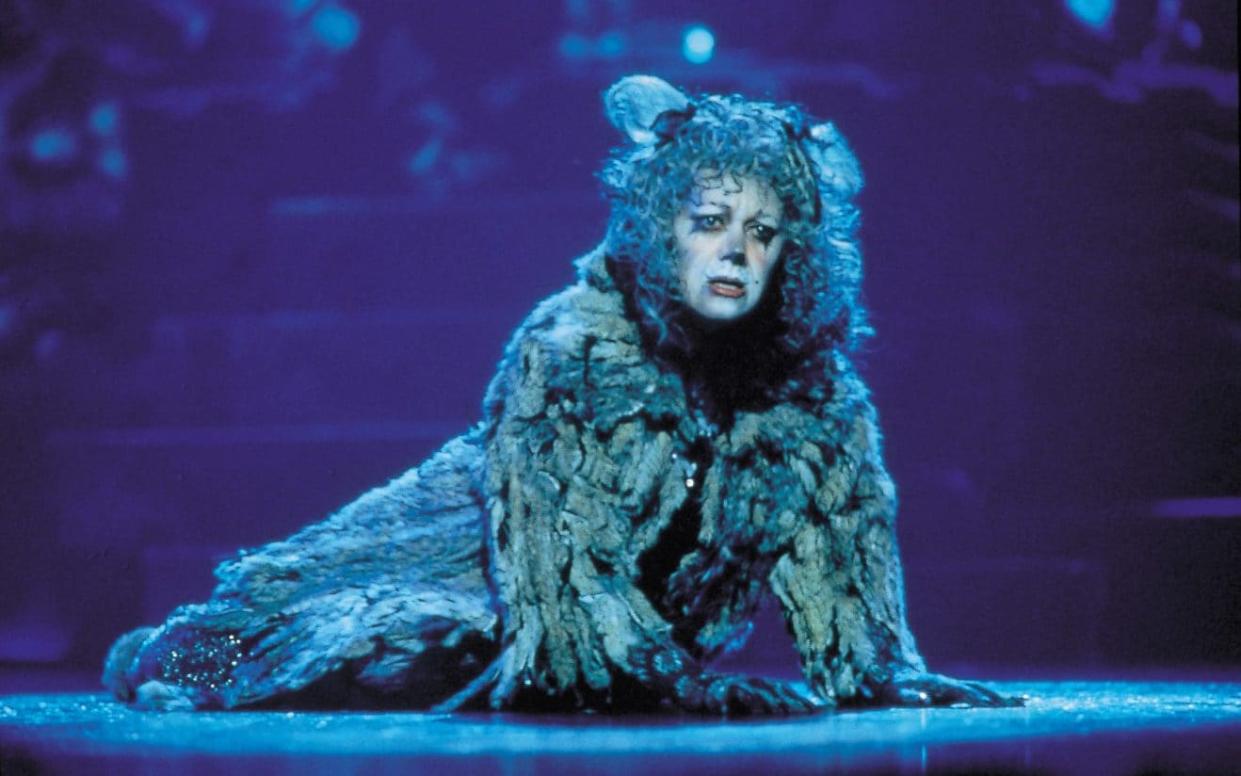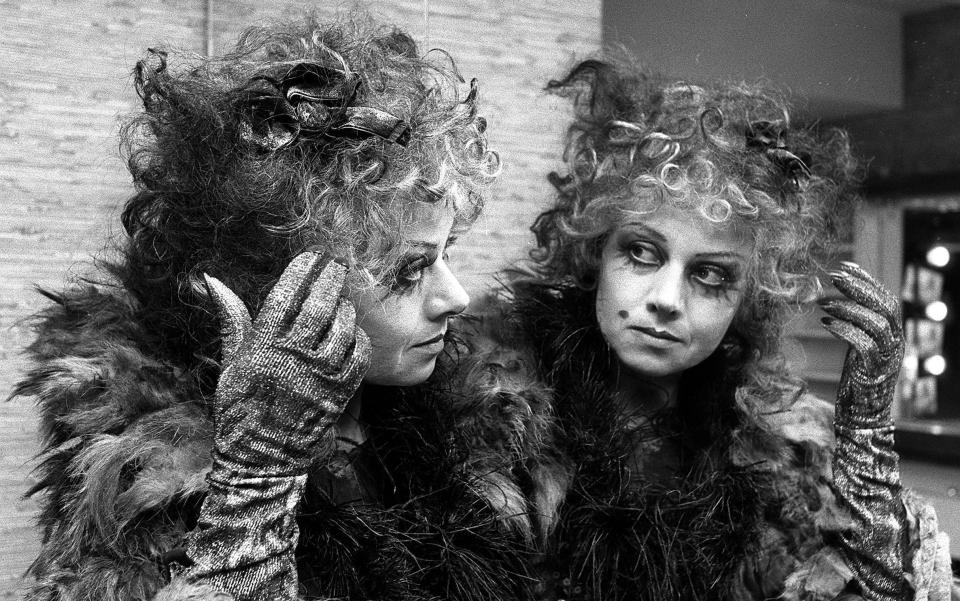Let the Memory live again: the turbulent history of the Cats showstopper

When Tom Hooper’s film Cats arrived in cinemas last year, it was roundly panned by critics. The general consensus was that few of its ludicrously starry cast escaped to tell the tale – except for Jennifer Hudson, as Grizabella, who got to sing the musical’s most famous number, Memory.
Yes, Hudson’s showstopping moment was a direct mimic of Anne Hathaway’s turn in Les Mis, which Hooper directed as well. But the song was always the most narratively potent bit of Andrew Lloyd Webber’s bonkers musical, the 1998 film of which will be streaming on YouTube for 24 hours after 7pm tonight.
In Memory, Grizabella, an old cat of fading beauty, recalls the passing of her youth before being taken up to the “Heaviside Layer” for a new life. Her song has always been Cats’s lifeboat. It occupies less than 15 minutes of a 135-minute show, and yet has become part of its defining strapline. “Cats: the magic, the mystery, the memory will live forever”.
When constructing the musical, Lloyd Webber and director Trevor Nunn didn’t have much to work with: TS Eliot’s widow Valerie insisted that her husband’s collection of children’s poems, Old Possum’s Book of Practical Cats, could only be staged if the script consisted of his original verse (hence the eccentric plot).
But Valerie also offered a get-out, too, turning up to Lloyd Webber’s home with an unpublished Eliot poem about Grizabella, a “Glamour Cat” who had “haunted many a low resort”. She inspired the postmen to sigh, saddened by the sight of her: “You really would have thought she ought to be dead.” It was easy to see why Eliot didn’t include it in Old Possum’s Book, but for Lloyd Webber, Grizabella held a much-needed injection of pathos. She could be the heart and story of a show – especially when twinned with a letter from Eliot to his publisher, in which the Jellicle Cats get together for a party in which they head “Up, up, up, to the Heaviside Layer.”
It took Nunn to give Grizabella her voice. The production began work at the dawn of the 1980s, and auditions were nearing an end. Nunn insisted that the musical needed a centrepiece – something in the vein of Don’t Cry for Me Argentina, which had carried Evita through the West End in 1978.
Rummaging around also proved useful for Lloyd Webber. He unearthed a melody he’d written, inspired by Puccini (inspired deeply enough, in fact, that he asked his father, classical composer William Lloyd Webber, if he had stolen it. Bill replied: “It’s going to be worth two million dollars to you, you fool.”) He played it to Nunn, warning him: “It’s a very extravagant, emotional theme.” “Make it more emotional, more extravagant, and we'll have it in Cats,” Nunn replied.
The director called the cast over to listen as Lloyd Webber played, telling them to remember where were when they first heard this song. After all, by 1982, it would be on the US Billboard 100, sung by Barbara Streisand, and would appear in nine other countries’ Top 40s between 1981 and 1984.
It proved one of the few good memories of Cats’ creation: the musical director collapsed on the piano, then abandoned the project entirely. Choreographer Gillian Lynne rarely saw eye-to-eye with Nunn, while Lloyd Webber worried that the energetic moves would compromise the performance of his songs. Two days before curtain up, Tim Rice’s lyrics were deemed too depressing (“Daylight / I won’t care if it finds me / With no breath in my body / With no beat in my heart”) and Nunn rewrote them, forcing the number to be sung from a piece of paper during the final rehearsal.
The whole endeavour had been so fraught, so fractious, that producer Cameron Mackintosh and Lloyd Webber toasted what they believed would be the swansong of their careers ahead of the first preview.

So everyone was taken aback when the crowd applauded, rather than laughed. The reviews glowed; The Telegraph called it “purr-fect”. Memory became etched into musical-theatre canon.
For Elaine Paige, Memory has always been hers. It shouldn’t have been: one of the main factors in Cats’s production was the agreement got made was on the agreement that Judi Dench be given a role. Dench, the original Grizabella, suffered a snapped Achilles tendon 12 days before previews. Cynics, mired in production hell, spread rumours that she was making a hasty exit from the project.
It was Memory’s melody that won Paige over. She was a proven West End star, having recently won an Olivier Award for her performance as Eva Peron in Evita, but nevertheless she had a rocky start: “Each night during previews I had to grapple with a different lyric,” she told Playbill. “Tim Rice, Don Black, Richard Stilgoe all tried their hand until Trevor Nunn’s original lyric, inspired by lines from T S Eliot’s Rhapsody on a Windy Night, prevailed.”
There was time during the show to learn the ever-shifting versions. “It’s a long lonely wait to perform it,” Paige said. “The pressure builds as you’ve only one moment to shine. I needn’t have worried; Memory always brought the house down. Since then I’m told more than 150 artists have recorded it, but as the original Grizabella I’m possessive, and I still see it as my signature.”
Paige’s vocal ability also made its mark on the song. Last year, Lloyd Webber told the Wall Street Journal: “Judi didn’t have that kind of voice. It probably would have been much more like a kind of... how can I say. More like a kind of French chanteuse?”
Instead, Paige turned into Memory into a wailer worthy of only the most aspiring divas. Streisand was one of the first to take it on, but dozens have followed, from Barry Manilow and Betty Buckley (who was forced to sing the number three times at a callback by Nunn: “He kept saying, ‘More suicidal!’”) to Celine Dion (whose then-paucity of English saw it given an inappropriately jaunty air).
It has become an X Factor standard too, elevating the careers of Susan Boyle and Paul Potts. Paige maintains that her version is the best, and insists that she, like her parents before her, will have the song played at her funeral. “The tasteful Julian Lloyd Webber cello version,” she told The Telegraph. “I shall have myself singing”. (It is one of the most-requested swansongs worldwide.)
Nicole Scherzinger has arguably been involved in the most Cats-based drama in recent years. She led the West End version in 2014, but fell out with producers ahead of the Broadway transfer when they refused to put her name above the title of the show on the banners. Following the Cats tradition of production trouble, the star quit a week before rehearsals began, and Leona Lewis replaced her.
Paige never rated the former Pussycat Doll’s version anyway, having declared her too young and glamorous: “The truth of the song wasn’t there for me, because the lyric is all about reflection of one’s life… it’s all about the past and ageing, looking back on your life, so it didn’t make too much dramatic sense to me.”
Some of the more unexpected comments on Hudson’s cinematic rendition were about the level of snot involved. “It is one note of relentless sadness, with a full-on weeping breakdown in the first scene and snot on her upper lip for the entirety of the movie,” observed The Daily Beast.
“Jennifer Hudson tirelessly over-emotes in the role; she limps around hemorrhaging snot and looking either miserable or terrified, like she’s been watching the dailies,” The Hollywood Reporter agreed. “Hudson went all in, snot streaming down her nose,” Stylist chimed in.
But mucus, too, plays its own part in Memory’s rich history. Betty Buckley, who sang the number in Broadway in the early 1980s, still remembers having to perform the song with a cold: “Tears were streaming down my face,” she told Playbill, “and my nose was running, and as I came up for the ‘Touch me, it’s so easy to leave me’ section, a line of mucus made an arc through the air, still attached to my nose.
“I saw this silver line stretching about two feet in space and used my “paw” to fling it away. I witnessed all the cats onstage, watching me in horror and cringing in disgust. It was hilarious!” Loni Ackerman, who took over from her, agreed, saying the most challenging part of delivering Memory was “waiting all evening, praying that the Goddess of Phlegm will not make a guest appearance!”
The Cats film, to reiterate, is terrible. The critics got that right. But it would take more than some ill-advised “digital fur technology” to dampen the appeal of Memory. As the film of the musical returns to locked-down screens, prepare to relive the burnt-out ends of smoky days and the cold, stale smell of morning. For Memory, a new day has begun.

